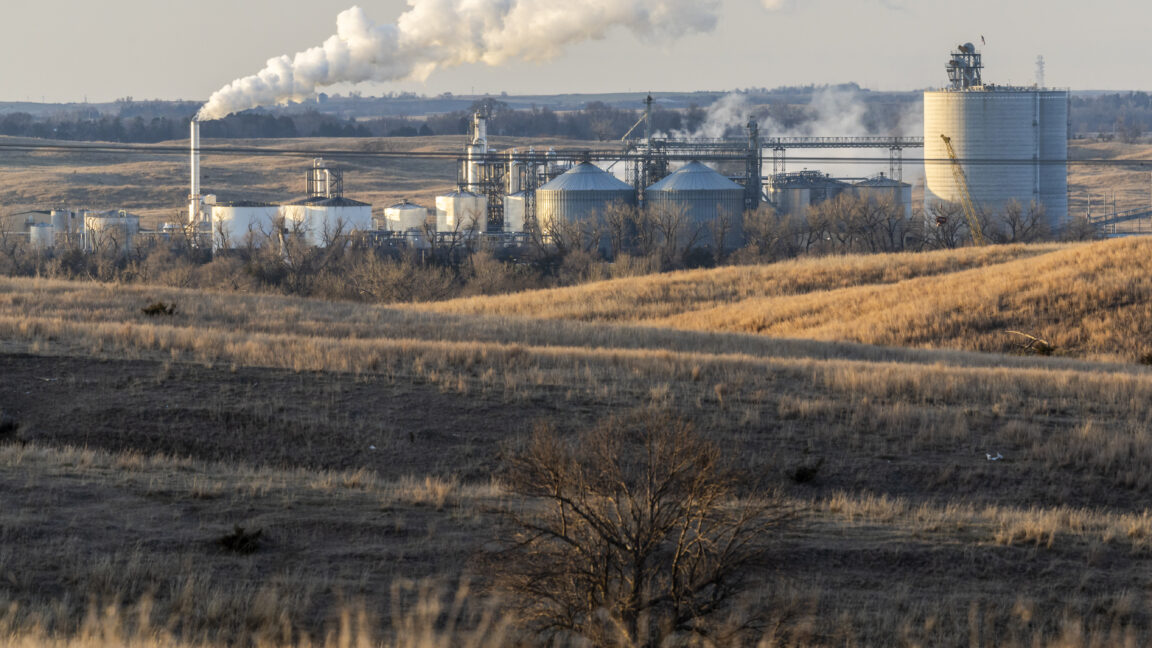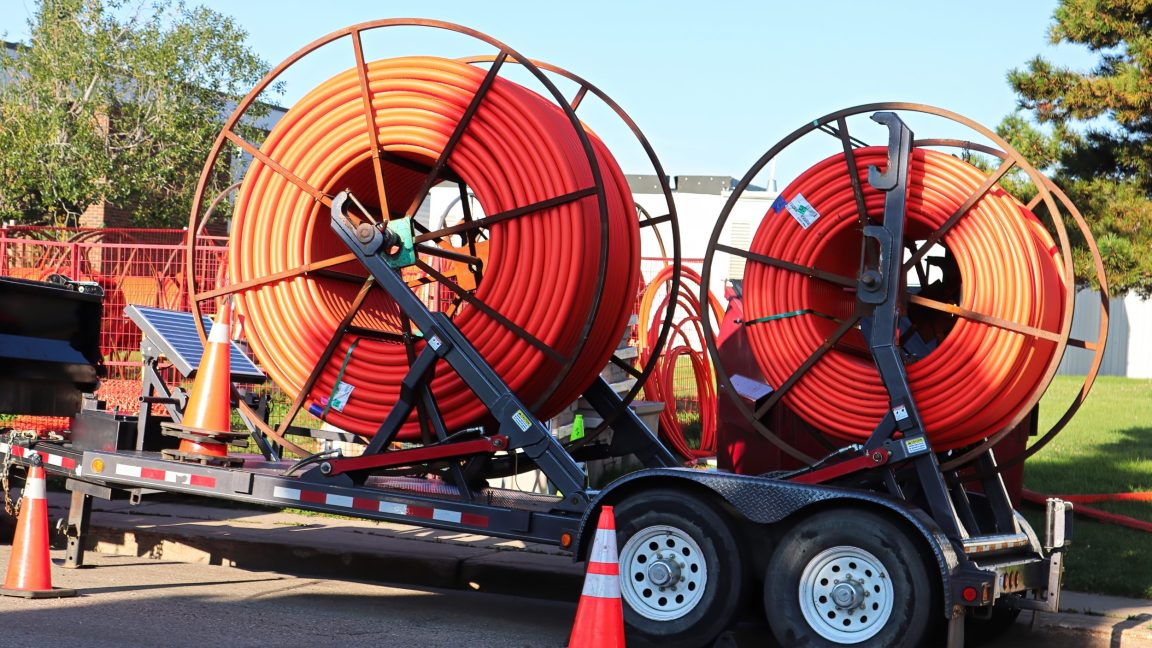This article originally appeared on Inside Climate News, a nonprofit, non-partisan news organization that covers climate, energy, and the environment. Sign up for their newsletter here.
The American Midwest is home to some of the richest, most productive farmland in the world, enabling its transformation into a vast corn- and soy-producing machine—a conversion spurred largely by decades-long policies that support the production of biofuels.
But a new report takes a big swing at the ethanol orthodoxy of American agriculture, criticizing the industry for causing economic and social imbalances across rural communities and saying that the expansion of biofuels will increase greenhouse gas emissions, despite their purported climate benefits.
The report, from the World Resources Institute, which has been critical of US biofuel policy in the past, draws from 100 academic studies on biofuel impacts. It concludes that ethanol policy has been largely a failure and ought to be reconsidered, especially as the world needs more land to produce food to meet growing demand.
“Multiple studies show that US biofuel policies have reshaped crop production, displacing food crops and driving up emissions from land conversion, tillage, and fertilizer use,” said the report’s lead author, Haley Leslie-Bole. “Corn-based ethanol, in particular, has contributed to nutrient runoff, degraded water quality and harmed wildlife habitat. As climate pressures grow, increasing irrigation and refining for first-gen biofuels could deepen water scarcity in already drought-prone parts of the Midwest.”
The conversion of Midwestern agricultural land has been sweeping. Between 2004 and 2024, ethanol production increased by nearly 500 percent. Corn and soybeans are now grown on 92 and 86 million acres of land respectively—and roughly a third of those crops go to produce ethanol. That means about 30 million acres of land that could be used to grow food crops are instead being used to produce ethanol, despite ethanol only accounting for 6 percent of the country’s transportation fuel.
The biofuels industry—which includes refiners, corn and soy growers and the influential agriculture lobby writ large—has long insisted that corn- and soy-based biofuels provide an energy-efficient alternative to fossil-based fuels. Congress and the US Department of Agriculture have agreed.
The country’s primary biofuels policy, the Renewable Fuel Standard, requires that biofuels provide a greenhouse gas reduction over fossil fuels: The law says that ethanol from new plants must deliver a 20 percent reduction in greenhouse gas emissions compared to gasoline.
In addition to greenhouse gas reductions, the industry and its allies in Congress have also continued to say that ethanol is a primary mainstay of the rural economy, benefiting communities across the Midwest.
But a growing body of research—much of which the industry has tried to debunk and deride—suggests that ethanol actually may not provide the benefits that policies require. It may, in fact, produce more greenhouse gases than the fossil fuels it was intended to replace. Recent research says that biofuel refiners also emit significant amounts of carcinogenic and dangerous substances, including hexane and formaldehyde, in greater amounts than petroleum refineries.
The new report points to research saying that increased production of biofuels from corn and soy could actually raise greenhouse gas emissions, largely from carbon emissions linked to clearing land in other countries to compensate for the use of land in the Midwest.
On top of that, corn is an especially fertilizer-hungry crop requiring large amounts of nitrogen-based fertilizer, which releases huge amounts of nitrous oxide when it interacts with the soil. American farming is, by far, the largest source of domestic nitrous oxide emissions already—about 50 percent. If biofuel policies lead to expanded production, emissions of this enormously powerful greenhouse gas will likely increase, too.
The new report concludes that not only will the expansion of ethanol increase greenhouse gas emissions, but it has also failed to provide the social and financial benefits to Midwestern communities that lawmakers and the industry say it has. (The report defines the Midwest as Illinois, Indiana, Iowa, Kansas, Michigan, Minnesota, Missouri, Nebraska, North Dakota, Ohio, South Dakota, and Wisconsin.)
“The benefits from biofuels remain concentrated in the hands of a few,” Leslie-Bole said. “As subsidies flow, so may the trend of farmland consolidation, increasing inaccessibility of farmland in the Midwest, and locking out emerging or low-resource farmers. This means the benefits of biofuels production are flowing to fewer people, while more are left bearing the costs.”
New policies being considered in state legislatures and Congress, including additional tax credits and support for biofuel-based aviation fuel, could expand production, potentially causing more land conversion and greenhouse gas emissions, widening the gap between the rural communities and rich agribusinesses at a time when food demand is climbing and, critics say, land should be used to grow food instead.
President Donald Trump’s tax cut bill, passed by the House and currently being negotiated in the Senate, would not only extend tax credits for biofuels producers, it specifically excludes calculations of emissions from land conversion when determining what qualifies as a low-emission fuel.
The primary biofuels industry trade groups, including Growth Energy and the Renewable Fuels Association, did not respond to Inside Climate News requests for comment or interviews.
An employee with the Clean Fuels Alliance America, which represents biodiesel and sustainable aviation fuel producers, not ethanol, said the report vastly overstates the carbon emissions from crop-based fuels by comparing the farmed land to natural landscapes, which no longer exist.
They also noted that the impact of soy-based fuels in 2024 was more than $42 billion, providing over 100,000 jobs.
“Ten percent of the value of every bushel of soybeans is linked to biomass-based fuel,” they said.



 In this search, Google's AI says the crash involved an Airbus A330 instead of a Boeing 787.
Credit:
/u/stuckintrraffic
In this search, Google's AI says the crash involved an Airbus A330 instead of a Boeing 787.
Credit:
/u/stuckintrraffic


